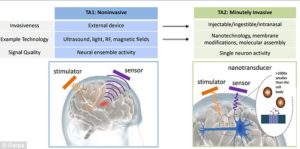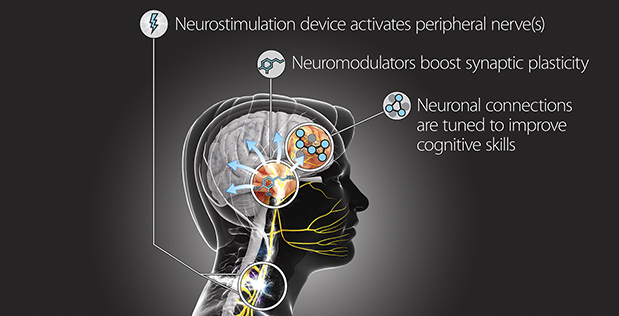 It is called Targeted Neuroplasticity Training (TNT), DARPA’s research program that aims boosting synaptic plasticity to accelerate learning.
It is called Targeted Neuroplasticity Training (TNT), DARPA’s research program that aims boosting synaptic plasticity to accelerate learning.
It takes years to learn some of the most important national security skills, such as speaking foreign languages, analyzing surveillance images, and marksmanship. The U.S. Department of Defense (DoD) wants to speed up that training process using electrical stimulation to enhance the brain’s ability to learn. The Defense Department’s research arm, the Defense Advanced Research Projects Agency (DARPA), announced it on march the 3rd, 2016. DARPA had awarded multimillion-dollar contracts to eight university groups that will study and develop such technologies. [1]
 The new program, Targeted Neuroplasticity Training (TNT), seeks to advance the pace and effectiveness of a specific kind of learning—cognitive skills training—through the precise activation of peripheral nerves that can in turn promote and strengthen neuronal connections in the brain. TNT will pursue development of a platform technology to enhance learning of a wide range of cognitive skills, with a goal of reducing the cost and duration of the Defense Department’s extensive training regimen, while improving outcomes. If successful, TNT could accelerate learning and reduce the time needed to train foreign language specialists, intelligence analysts, cryptographers, and others.
The new program, Targeted Neuroplasticity Training (TNT), seeks to advance the pace and effectiveness of a specific kind of learning—cognitive skills training—through the precise activation of peripheral nerves that can in turn promote and strengthen neuronal connections in the brain. TNT will pursue development of a platform technology to enhance learning of a wide range of cognitive skills, with a goal of reducing the cost and duration of the Defense Department’s extensive training regimen, while improving outcomes. If successful, TNT could accelerate learning and reduce the time needed to train foreign language specialists, intelligence analysts, cryptographers, and others.
DARPA wants to see a 30 percent improvement in learning rates by the end of the four-year program. Studies will be conducted on human volunteers and animals. DARPA did not disclose the total value of the research contracts. [2]
 For the new stimulation project, dubbed targeted neuroplasticity training, or TNT, research teams will focus on peripheral nerves that project into the brain and tug at memories. By delivering electrical pulses into the body’s nervous system, the scientists aim to modulate the brain’s neural connectivity and production of key chemicals. That kind of neural tuning can “influence cognitive state—how awake you are, or how much attention you’re paying to something you’re viewing or performing,” says Doug Weber, a bioengineer at DARPA who heads up the TNT project. [4]
For the new stimulation project, dubbed targeted neuroplasticity training, or TNT, research teams will focus on peripheral nerves that project into the brain and tug at memories. By delivering electrical pulses into the body’s nervous system, the scientists aim to modulate the brain’s neural connectivity and production of key chemicals. That kind of neural tuning can “influence cognitive state—how awake you are, or how much attention you’re paying to something you’re viewing or performing,” says Doug Weber, a bioengineer at DARPA who heads up the TNT project. [4]
But before DARPA can sharpen its sharpshooters, it must figure out exactly where and how to stimulate the body’s nervous system. That’s the charge to the university groups—to understand the anatomy and function of neural circuits associated with learning.
 In one experiment, with help from the U.S. Air Force Research Laboratory, volunteers will watch surveillance video and try to identify a person carrying a weapon. In another experiment, in partnership with a military research laboratory called USARIEM, volunteers will fire rifles at long ranges in a virtual shooting range while their behavior and performance are quantified. [3]
In one experiment, with help from the U.S. Air Force Research Laboratory, volunteers will watch surveillance video and try to identify a person carrying a weapon. In another experiment, in partnership with a military research laboratory called USARIEM, volunteers will fire rifles at long ranges in a virtual shooting range while their behavior and performance are quantified. [3]

The agency is looking to see this done in one of two ways: a non-invasive device outside of the body, or a non-surgical system that could be swallowed, injected, or delivered up the nose
Other TNT awardees are focusing on the vagus nerve—a major neural throughway that connects most of the body’s key organs. Researchers in 2011 reported in Nature that stimulating the vagus nerve enabled rats to better recognize auditory cues. That report, in part, inspired DARPA’s TNT program, Weber says. [3]
TNT researchers will likely face some ethical questions, such as the ethics of using enhancement on war fighters, says Helms Tillery, a neuroscientist at Arizona State University, one of the awarded teams. [2]
If electrical stimulation proves effective at enhancing learning, how pervasive and mandatory it would become in the military is unclear. Sure is, DARPA is on its way to create troops of cognitively enhanced super soldiers.
References
[1] https://www.darpa.mil/news-events/2016-03-16
[2] https://spectrum.ieee.org/the-human-os/biomedical/devices/darpa-to-use-electrical-stimulation-to-improve-military-training
[3] https://www.defense.gov/News/Article/Article/1164793/darpa-funds-brain-stimulation-research-to-speed-learning/
[4] https://www.darpa.mil/program/targeted-neuroplasticity-training
